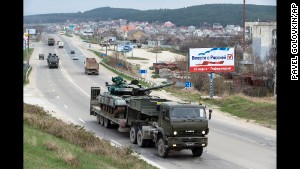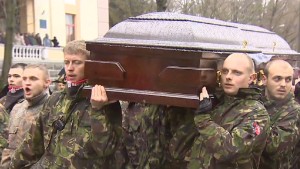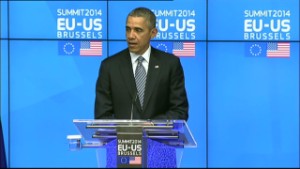Editor's note: Alexander J. Motyl is professor of political science at Rutgers University-Newark. He was associate director of the Harriman Institute at Columbia University from 1992 through 1998. A specialist on Ukraine, Russia and the former Soviet Union, Motyl is the author of six academic books and several novels, including "The Jew Who Was Ukrainian," "My Orchidia" and "Sweet Snow." He writes a weekly blog on "Ukraine's Orange Blues" for World Affairs Journal.
(CNN) -- When Russian Minister of Defense Sergei Shoigu stated that the Russian troops along Ukraine's borders were only conducting "training exercises" and have no "intention to cross Ukraine's borders or to engage in any aggressive actions," Ukrainians rolled their eyes.
And when President Vladimir Putin told Ukrainians "Don't believe those who terrify you with Russia, who shout that other regions will follow Crimea. We do not want Ukraine's division. ... We want Ukraine to be a strong, sovereign, and self-sufficient state," Ukrainians shrugged.
The problem is, even if Putin and Shoigu were being sincere, Moscow has lost all credibility among most Ukrainians and the international community. After three weeks of aggressive Russian behavior and the possibility of existential annihilation, Ukrainians, like Israelis, prefer to think in terms of worst-case scenarios. After all, they blithely assumed Russia would never attack -- and then Russia seized Crimea.
 Alexander Motyl
Alexander Motyl They never imagined that Russian officials would treat their country as an object of abject scorn. They never suspected that thousands of Russians would chant anti-Ukrainian war slogans in the streets of Moscow. In each instance, Ukrainians' working assumption of a friendly Russia proved dead wrong.
They also never imagined that the Yanukovych regime had so thoroughly permitted Ukraine's defensive capacity to deteriorate, by sacrificing Ukrainian security on the altar of the Yanukovych family's untrammeled accumulation of power and embezzlement of state funds.
A political scientist at Kiev's elite Mohyla University has stated that he is not "not optimistic about Ukraine maintaining the integrity of even its mainland territorial borders" until the end of March and has evacuated his family from the capital.
A friend in Lviv tells me that "an invasion and war are unavoidable." An American businessman in Kiev writes: "I believe we are closer to World War III than we have ever been." In many parts of the country, Ukrainians have taken to preparing little suitcases with all the necessities -- just in case they have to flee at a moment's notice.
 Intel: Likely Russia will invade Ukraine
Intel: Likely Russia will invade Ukraine Ukrainians' jitters are perfectly understandable. Ukrainian officials say that 80,000 Russian troops and heavy armor are amassed on Ukraine's borders. Putin claims to have the right to intervene anywhere in Ukraine if and when he deems that Russian citizens are being threatened.
 Ukraine's right sector leader killed
Ukraine's right sector leader killed  Obama: Russia stands alone
Obama: Russia stands alone He and myriad Russian policymakers routinely insist that Ukrainians are really Russians and that Ukraine is an artificial entity. Thus far, Moscow refuses to recognize the democratic government in Kiev and claims that it is no longer bound by the 1994 Budapest Memorandum on Security Assurances.
Because of Russia's occupation of Crimea and Putin's militarist rhetoric, many Ukrainians are certain that war is inevitable. Prime Minister Arsenii Yatseniuk warned Moscow on March 20 that Ukraine's response to a Russian invasion would be vigorous.
Kiev has already begun improving its defensive capabilities. On March 17, the Ukrainian Parliament allocated 6.9 billion hryvnia -- about $684 million -- to defense. In the last few weeks, Ukrainian armed forces, tanks and other defensive weapons have been deployed along the country's border with Russia. The number of border guards along Ukraine's southeastern borders has also increased. Kherson province is planning to build a 20-kilometer long ditch along its border with Crimea.
A National Guard has been formed, and its ranks are to consist of 20,000 troops. The Ukrainian Security Service appears also to have become more active in Ukraine's vulnerable southeastern provinces. No less important, the population is determined to resist and sales of guns have far outstripped supply.
Thinking in more long-term categories, former Minister of Foreign Affairs Volodymyr Ohryzko
{ 0 comments... read them below or add one }
Post a Comment